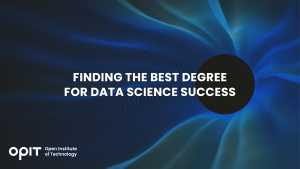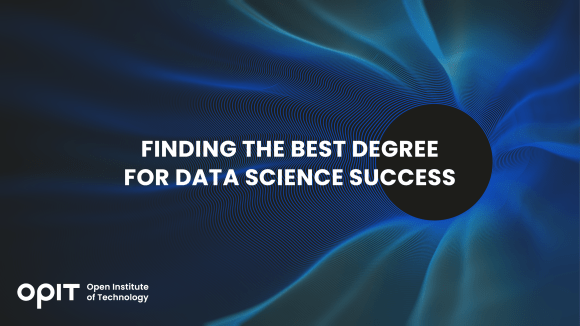

By 2025 the global data volume will approach 175 zettabytes. Store that information on DVDs and the stack would reach the moon 23 times over. That sheer volume of data means that professionals are required to make sense of the information.
Sectors like finance, healthcare, manufacturing, and telecoms use vast amounts of data and present attractive career opportunities. Choosing the best degree for data science can open up new doors for those interested in playing a leading role in the lucrative field of data science.
Understanding Data Science and Its Educational Pathways
Data science has always been important. Businesses have been leveraging the power of data ever since the term was invented, but the data landscape is changing.
Today, data science combines math and statistics, advanced analytics, specialized programming, Artificial Intelligence (AI), and machine learning to provide actionable strategic insights to organizations.
Aspirant professionals interested in playing a data-centric role in the success of an organization need appropriate, respected, and relevant qualifications, and finding the best degree for data science is the first step on the road to success.
That road offers many routes toward success in the individual’s chosen field.
Some data science career trajectories include:
- Data scientist
- Data analyst
- Business analyst
- Business intelligence analyst
Mid-Level
- Data architect
- Data engineer
- Senior business analyst
Senior-Level
- Lead data scientist
- Director of data science
- Vice president of data science
- Chief information officer
- Chief operations officer
What to Look For in a Data Science Degree
A firm foundation is essential for a rewarding career in data science, and that foundation must include a recognized undergraduate degree. The best degree for data science will be obtained from an accredited and well-respected education institution. It will provide foundational skills in areas such as data analysis, machine learning, big data, and statistical analysis (among others).
However, the structure of the coursework is important. An undergraduate degree in data science should:
- Provide a solid understanding of principles and theory
- Offer practical experience based on real-world immersion
- Give opportunities for specialization
In addition, a world-class program will emphasize teamwork, innovation and effective communication and offer the chance to make industry connections.
Best Degree for Data Science: Which One Should You Choose?
Navigating the sometimes murky waters of higher education can be a daunting task, especially when it comes to choosing the best degree for data science, but here are some well-respected choices.
1. M.S. In Data Analytics – Franklin University
This online qualification will equip the professional with the statistical skills required to conduct descriptive and predictive analytics. It also provides the programming skillset necessary to create and apply computer algorithms and the tools and platforms to visualize and mine big data. Students can expect to complete the coursework in around 19 months.
2. Bachelor of Science in Industrial Systems Data Analytics – Lakeland University
The strength of this qualification from Lakeland is its focus on both programming and data management. The flexibility of the on-campus/online program makes it a very attractive option for those who already hold a 9-5 job. This program provides students with essential skills in programming, statistics, data analysis, and visualization.
3. Bachelor of Science in Data Analytics – Southern New Hampshire University
Although this is an online course, the experience of using advanced analytical tools to solve real-world challenges will provide potential employers with peace of mind. Also on offer is a focus on project management, which is essential given the complexities of data-driven projects. Focus areas include data analytics, computer science, and computer programming. The course should take four years to complete, although online delivery allows students to graduate more quickly
4. Bachelor of Science in Computer Science – Full Sail University
This program focuses on data structure and system design. The online and on-campus study option means that students can finish the coursework in less than 80 weeks. Focusing on core competencies such as computer science, computer programming, and data science, it is the perfect qualification for those entering the potentially rewarding world of data science.
5. Bachelor of Science in Data Analytics – Lynn University
The 100% online undergraduate qualification in data analytics can be completed in four years or less. Coursework includes business analytics, advanced business techniques, data programming, and data mining. With a focus on real-world solutions, this is a program that will pay dividends in increased employability in a highly competitive environment.
OPIT’s Bachelor’s and Master’s Programs in Data Science
OPIT’s Bachelor’s (BSc) in Modern Computer Science and Master’s Degrees (MSc) in Applied Digital Business and Applied Data Science & Artificial Intelligence have been designed with input from industry leaders and feature real-world application of the skills gained through study. This approach results in qualifications that are extremely attractive to potential employers.
The BSC in Modern Computer Science
The coursework of the six-term Bachelor’s in Modern Computer Science is delivered entirely using state-of-the-art platforms designed for ease of use and flexibility.
Both potential employers, academics, and industry professionals have had a hand in developing this degree. It aims to provide graduates with theoretical and practical 360-degree foundational skills, including such coursework as programming, software development, database development and functionality. Students will also dive into more complex topics like cloud computing, cybersecurity, data science, and the ever-more important subject of Artificial Intelligence.
The MSC in Applied Digital Business and Applied Data Science & Artificial Intelligence
The 12–18 month Master’s Degree (MSc) in Applied Digital Business from OPIT supplies students with the knowledge and skills to tackle real-world challenges in technology, digitalization, and business. Coursework includes strategically orientated subjects such as digital transformation, digital finance, entrepreneurship, and digital product management. Students will also explore real-world applications with a capstone project and dissertation based on a real-world case study.
The 12-18 month Master’s in Applied Data Science & Artificial Intelligence is at the cutting edge of data science specialization. Online delivery of coursework means that students have incredible flexibility and can complete coursework at their own pace, a boon for busy professionals. Like other OPIT Master’s courses, this program emphasizes foundational principles and courses with content applicable to real-world challenges that can be analyzed using data science and AI. Coursework includes business principles, data science, machine learning, and Artificial Intelligence.
Why Consider OPIT for Your Data Science Education?
OPIT’s affordable, fully accredited, and internationally recognized degrees leverage knowledge from leading academics and industry leaders. This ensures the most relevant course content and resources, all delivered via cutting-edge online platforms. The institute’s flexible scheduling, the blend of theoretical and practical knowledge, and hands-on experience deliver an educational experience unlike any other available today.
The Future of Data Science and the Role of Education
The amount of data that has to be gathered, stored and analyzed by businesses is growing exponentially. This has fueled increasing demand for skilled and qualified data scientists. Employers are looking for the best of the best, and one of the time-proven ways to stand out from the crowd is by obtaining a recognized and respected qualification – the best degree for data science.
Of course, the learning doesn’t stop at one degree. Data science pioneers know the importance of lifelong learning and staying abreast of the latest methodologies, trends, and advancements.
A Data Science Degree – Making the Right Choice
Choosing the best degree for data science can be a challenge, but that challenge becomes manageable when one whittles down the choices. Make sure that the education provider you choose has impeccable credentials and a good reputation. Both of these are based on the delivery of exceptional course content that focuses on both theory and real-world experience.
Employers want graduates who can hit the ground running. Choosing a degree from OPIT means that the employee can start adding real value to organizational strategy from Day 1, and that is what employers want.
Related posts


Source:
- Il Sole 24 Ore, published on June 23rd, 2025
At its core is a teaching heritage made up of 131 courses, 3,500 hours of video, 1,800 live sessions
Have questions?
Visit our FAQ page or get in touch with us!
Write us at +39 335 576 0263
Get in touch at hello@opit.com
Talk to one of our Study Advisors
We are international
We can speak in:


